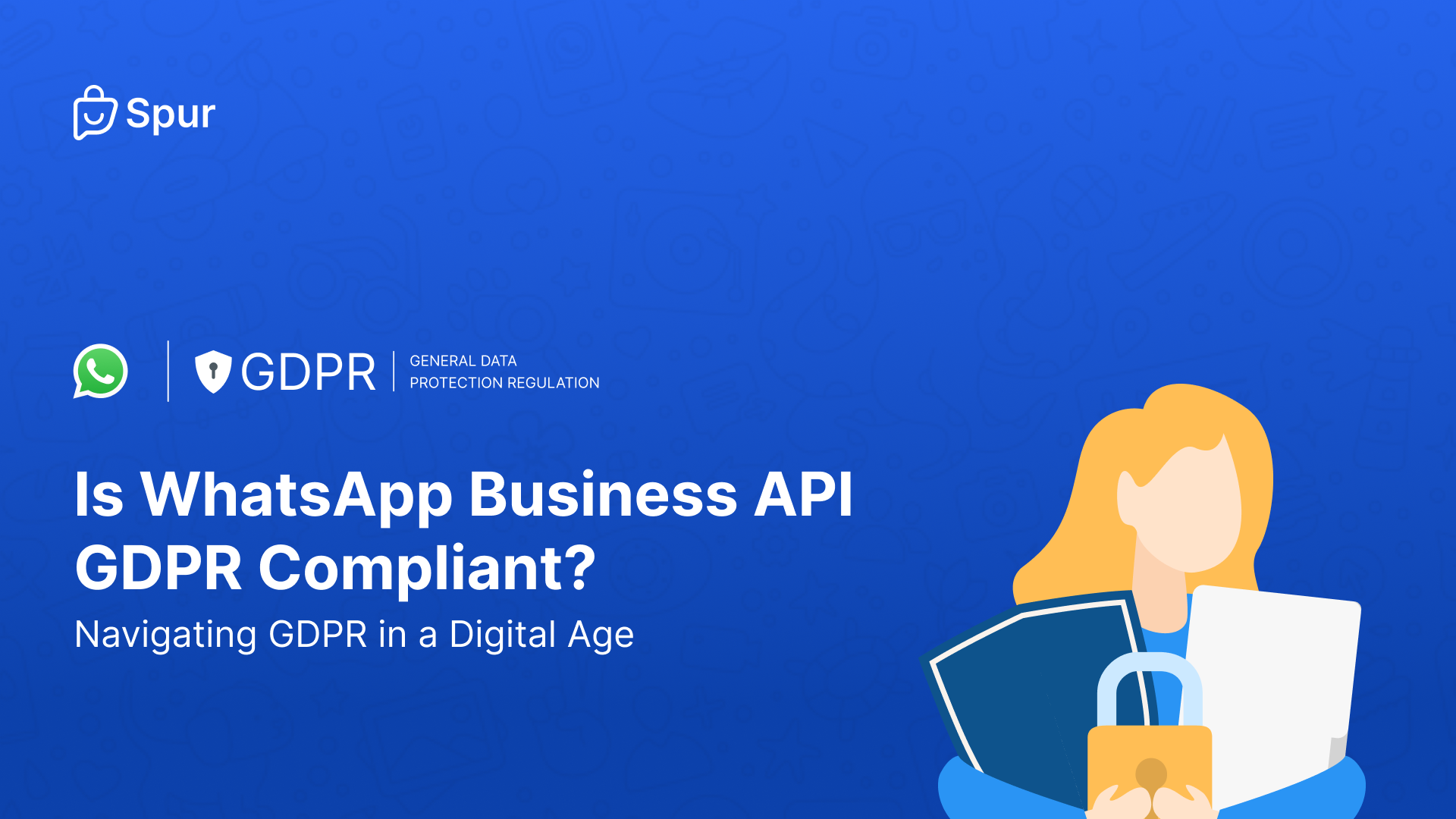
Is WhatsApp API GDPR Compliant?
Discuss with AI
Get instant insights and ask questions about this topic with AI assistants.
💡 Pro tip: All options include context about this blog post. Feel free to modify the prompt to ask more specific questions!
- WhatsApp Business API is GDPR-compliant with proper use.
- Differences exist between WhatsApp Private, Business App, and the Business API, with the API offering better compliance tools.
- The API allows automated consent handling, secure EU-based data storage, and transparency.
- Compliance requires clear consent, opt-outs, transparent data handling, and working with GDPR-compliant partners.
Yes, GDPR applies to email & web, but it also applies to businesses talking to customers on WhatsApp. Here's what it means and how the WhatsApp Business API is related to it.
GDPR (General Data Protection Regulation) mandates strict rules for handling the personal data of EU citizens. Any business using WhatsApp for customer communications must ensure they comply with GDPR, especially when collecting data like phone numbers and purchasing history.
The WhatsApp Business App is a free tool designed for small-scale use, but it lacks advanced compliance features. In contrast, the WhatsApp Business API (now known as the WhatsApp Business Platform) is designed for larger businesses and comes with features that make GDPR compliance more straightforward.
- WhatsApp Business App requires manual data management, which could lead to errors in GDPR compliance.
- WhatsApp Business API allows for automated consent tracking, safer data storage in GDPR-compliant regions like the EU, and easier management of customer data.
Considering how easy it is to screenshot and share WhatsApp messages, we really dont recommend using the WhatsApp Business Mobile App as a business
With the API, companies can automate many of the processes required to stay compliant, such as tracking customer consent, managing opt-outs, and storing data securely.
In today's world, businesses constantly interact with customers through digital platforms like WhatsApp. But it is the responsibility of the brand to protect customer data. In the EU, that means adhering to the strict rules of the General Data Protection Regulation (GDPR).
But how does this apply to WhatsApp, and more importantly, does the WhatsApp Business API meet GDPR standards? Let’s dive into this question, starting with an important distinction between the different versions of WhatsApp.
In today's world, businesses constantly interact with customers through digital platforms like WhatsApp. But with great power comes great responsibility—specifically the responsibility to protect customer data. In the EU, that means adhering to the strict rules of the General Data Protection Regulation (GDPR).
But how does this apply to WhatsApp, and more importantly, does the WhatsApp Business API meet GDPR standards? Let’s dive into this question, starting with an important distinction between the different versions of WhatsApp.
Imagine two businesses: one is a local coffee shop using the WhatsApp Business App to message a handful of loyal customers. The other is an international fashion brand sending out promotional messages to thousands of customers every day using the WhatsApp Business API.
While the coffee shop might manage its data manually, the fashion brand needs automated systems to handle customer consent, secure data storage, and opt-outs. This is where the WhatsApp Business Platform (API) shines—it’s built for scale and compliance, unlike the WhatsApp Business App, which leaves much of the GDPR burden on the business itself.
The API is designed to support larger businesses, offering automated features that make GDPR compliance not just possible, but efficient.
To understand how the WhatsApp Business API fits into GDPR compliance, it’s crucial to first look at what GDPR requires:
- Consent is Key: Customers must agree before receiving any messages. The API simplifies this by automating consent requests and storing them securely.
- Opt-Out Options: Customers must have the right to opt out of communication at any time. The API helps businesses create automated opt-out systems that are easy to manage and track.
- Data Transparency: Customers should always know what data you’re collecting and why. With the API, businesses can set up automatic notifications, ensuring transparency.
- Secure Data Storage: Data must be stored securely, ideally in GDPR-compliant regions like the EU. The WhatsApp Business API ensures customer data is stored in safe, EU-based servers, meeting this requirement effortlessly.
When you sign up on Spur, an official Meta Tech Partner, automated opt in and opt out flows are built for you.
Each of these components is crucial for GDPR compliance, and the API’s automated features provide peace of mind to businesses operating at scale.
Let’s say you run an online clothing store and use WhatsApp to send product updates and promotions to your customers. Without the WhatsApp Business API, you might have to manually track who consented to receive messages, store their data securely, and manage opt-out requests—all while trying to focus on growing your business.
With the API, however, these processes become automated. Consent is collected and stored automatically. Customers can easily opt out, and their data is stored on secure EU servers. Your team can focus on serving customers, while the API ensures compliance in the background.
Even with the API, businesses still need to actively ensure GDPR compliance. Here are key steps:
- Automate Consent Collection: Make use of the API’s consent tracking to gather and store customer permissions.
- Enable Opt-Out Automation: Ensure customers can opt out at any time, with an easy-to-use interface.
- Review Data Regularly: Perform audits to ensure your data practices remain GDPR-compliant.
- Be Transparent: Use the API to inform customers about how their data is collected and used.
- Work with Trusted Partners: Choose providers who store data in GDPR-compliant locations, such as the EU.
Complying with GDPR isn’t just about avoiding fines (which can be substantial). It’s also about building trust with your customers. In a world where data privacy is a growing concern, showing that your business is committed to protecting customer information can set you apart from competitors.
Like any other communication channel, using WhatsApp for business carries legal risks, particularly if you don't comply with regulations like GDPR. Non-compliance can lead to fines of up to €20 million or 4% of your company's annual turnover, whichever is higher. The risk might be higher on WhatsApp due to the ease of sharing screenshots of conversations. Even without fines, there could be reputational damage, and customers may block your business. This can lower your WhatsApp Business quality rating, impacting future communication.
Yes, the WhatsApp Business API is GDPR-compliant, but only when used correctly. Its automation features help businesses easily gather consent, manage data securely, and handle opt-outs, all while adhering to GDPR’s strict requirements.
For businesses that want to protect customer data and build trust, using the WhatsApp Business API is a smart choice. Make sure to leverage its features and partner with GDPR-compliant service providers to ensure full compliance.
